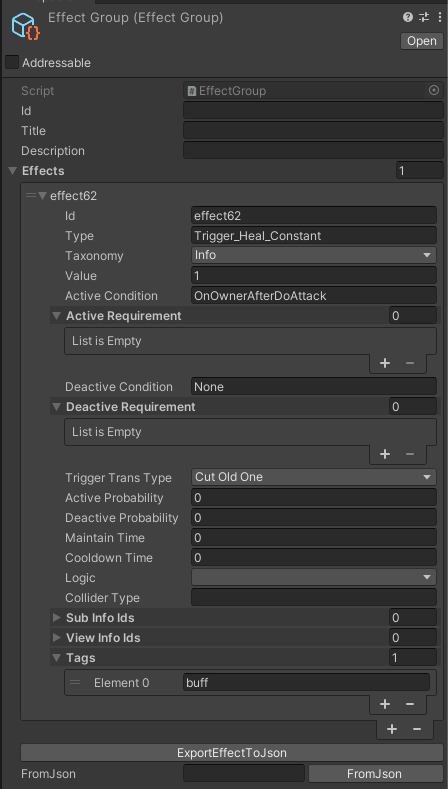Prepare Your Data
After understanding the concept of the EffectSystem, it's time to prepare your data. In previous examples, we directly created new EffectInfo using constructors, but there are other methods for setting up your effect data.
Unity Serialization
A straightforward approach is to create a List<EffectInfo> within a script (either a MonoBehaviour or ScriptableObject) in your project, and use the Unity Inspector to edit them.
EffectGroup
EffectGroup is a pre-defined Unity ScriptableObject designed to help you store EffectInfo in your project. It offers several useful features:
- Group a List of EffectInfos. Use EffectGroup directly in EffectSystem APIs.
- Export
EffectInfodata to JSON format. - Import
EffectInfodata from JSON.

Google Sheet Template
For more convenient batch data editing, we’ve designed a Google Sheet template to assist with this process.
Here’s an example table: Effect Data Sample Table
On the Effects tab in the sheet, the A1 field converts the entire Google Sheet's columns into a JSON file. You can save the JSON string anywhere (such as in a .json file) and deserialize it into a List<EffectInfo> at runtime.
Please make a copy of this sample and modify it as needed!
Pre Baked String for strong Type usage
On the ScriptOptions tab in the sheet, you can copy the A1 field directly into the Effect Editor Window to pre-bake all string parameters from your sheet into a script.
First, press the Select button to choose the path where the script will be saved. Then, paste the JSON into the input box below, and press Bake to add a new C# script to the specified path.
Since the system uses strings as IDs to reference other resources, it’s recommended to use pre-baked strings for all your parameters to ensure safer and more reliable usage.
EffectDataProvider
EffectDataProvider supplies the runtime data resources needed for the system. For example, if you’re using the subInfo feature, the system requires a delegate to retrieve EffectInfo by its ID at runtime. Since different projects manage their own EffectInfo data, you need to register the appropriate methods to ensure all features work correctly.
public static class EffectDataProvider
{
public static Func<List<string>, List<EffectInfo>> GetEffectInfo { get; private set; }
public static void SetEffectInfoDelegate(Func<List<string>, List<EffectInfo>> GetEffectInfo)
{
EffectDataProvider.GetEffectInfo = GetEffectInfo;
}
public static Func<List<string>, List<EffectViewInfo>> GetEffectViewInfo { get; private set; }
public static void SeEffectViewInfoDelegate(Func<List<string>, List<EffectViewInfo>> GetEffectViewInfo)
{
EffectDataProvider.GetEffectViewInfo = GetEffectViewInfo;
}
public static Func<string, string> GetEffectDescriptionString { get; private set; }
public static void SetEffectDescriptionStringDelegate(Func<string, string> GetEffectDescriptionString)
{
EffectDataProvider.GetEffectDescriptionString = GetEffectDescriptionString;
}
}
